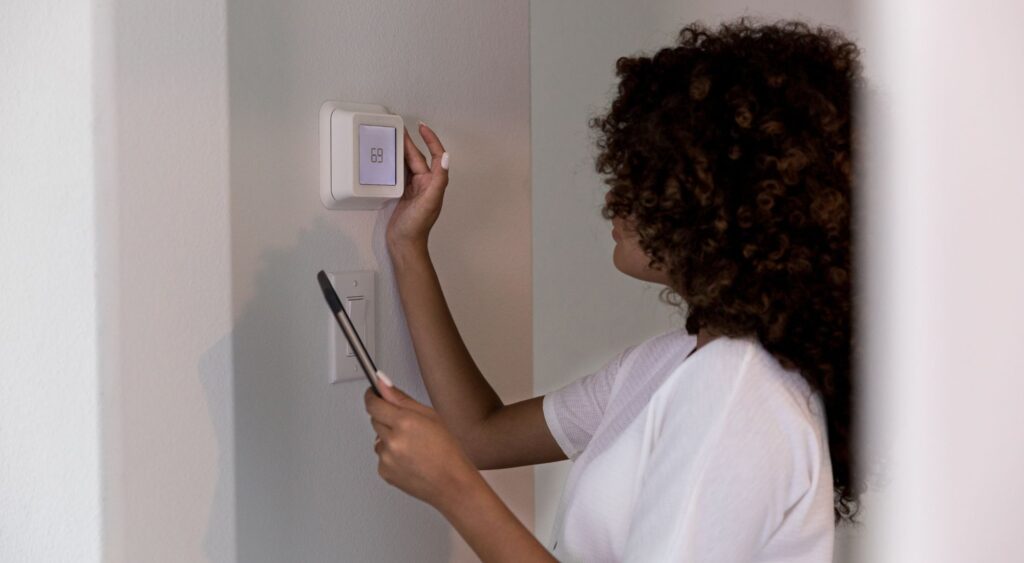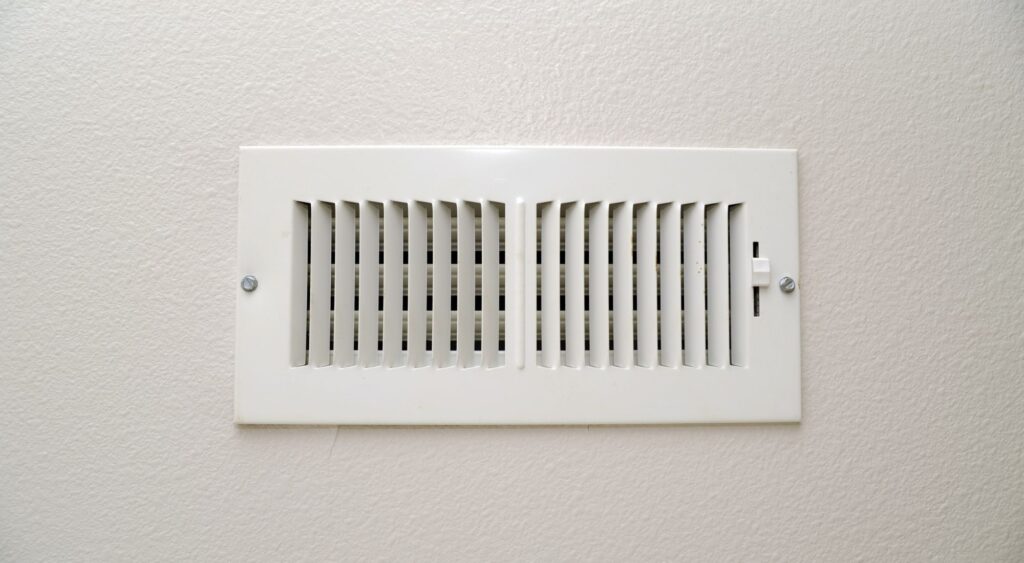Getting To Know Your HVAC Damper: Definition, Benefits, and FAQs
As a homeowner, no one expects you to have an encyclopedia of knowledge about your HVAC system, which is why you probably heard the term “HVAC damper” before but had no clue what it was.
Fortunately, AAA Heating and Cooling would be happy to get you up to speed on all the ins and outs of HVAC dampers.
Along with providing excellent service, our extensive HVAC knowledge can hardly be contained. Here, we will explain what a damper HVAC is, discuss its benefits, and address any other questions you may have.
Table of Contents
- What Is a Damper HVAC?
- How Do Dampers Work?
- Benefits of HVAC Dampers
- Other Common Questions About HVAC Dampers
- AAA Heating and Cooling: Residential HVAC Service, Repair & Installation in Beaverton & Portland
What Is a Damper HVAC?
A damper is a movable small valve or plate that controls the airflow in a building’s HVAC system.
These mechanisms regulate temperature through a zoning system. Zoning systems divide your home heating and cooling into different zones, giving you more options to control your air climate and energy usage.
Dampers monitor airflow, temperature, and humidity levels in your home while lowering or raising the zone’s temperature to your desired setting.
How Do Dampers Work?
Dampers control your home’s heating and cooling by opening and closing to limit one area while increasing it to the other.
HVAC zone dampers come in two types, manual and motorized:
- Manual dampers: These require the homeowner to twist a handle to regulate the airflow into a particular zone.
- Motorized or automatic dampers: These dampers work with your programmable zoning system and function independently. Because it works in tandem with programmable thermostats and other HVAC control systems, it tends to be more convenient and energy-efficient for homeowners.
Benefits of HVAC Dampers
One of the main benefits of dampers is that they improve your HVAC system’s control over airflow, therefore resulting in various other benefits.
Damper systems function differently than residential vent systems. Closing a vent on the floor or the wall will still allow air to travel through your ducts, thus wasting energy. HVAC dampers are located closer to the mouth of the distribution pipe, allowing them to regulate airflow as needed.
By preventing air leaks, dampers may help lower energy bills while also:
- Reducing noise (from the HVAC system)
- Saving energy
- Maximizing home comfort levels
- Lowering energy bills
One 2022 study found that home zoning systems may reduce heating and cooling bills by up to 30 percent. If you are looking to increase energy efficiency and save on utility bills, it might be time to consider a residential zoning system.
If you’re considering damper installation, AAA Heating and Cooling would love to help.
Our expert HVAC contractors in Beaverton and Portland can help you choose the right solution for your home or business. We are a family-owned company that is dedicated to providing quality services, repairs, installations, and outstanding customer service.
With every job we are assigned, we make sure to consider all of the factors to help you make informed decisions.
Other Common Questions About HVAC Dampers
Does Every HVAC System Have a Damper?
Not every HVAC system has dampers, but most do.
However, the number of dampers in a home may depend on its size and the HVAC system. Some builders may not choose to install dampers in homes to cut costs. If you do not have dampers, don’t worry!
A trusted HVAC professional should be able to install them. They will consider the size of your ducts, the type of dampers required, how to zone your rooms properly, and more.
AAA Heating in Cooling has provided reliable HVAC services to Portland and Beaverton communities for over 60 years. With an A+ Better Bureau Business (BBB) rating and commitment to high-quality products and services, no HVAC job is too little or too big for our team.
If you’re in the Beaverton or Portland area and need dampers installed, contact our team to schedule an appointment today.
Is It Okay To Close HVAC Dampers?
Yes! You can adjust your home’s temperature in various rooms by adjusting (opening/closing) your furnace’s dampers.
A manual HVAC damper contains a door that can be manually opened or closed to adjust airflow in a particular zone or room’s ductwork. To locate your dampers:
- Locate the main duct trunks leading from the furnace
- Look 2 to 6 feet off of the main trunk to easily identify your dampers
Once you have located your dampers, you can use the handle on each to either close or open them. The handle should be perpendicular to the duct when closed and pointing down the duct when opened. Each damper is associated with a specific room, so it’s essential to identify and label them.
How Long Do Dampers Last?
The quality of the equipment, how frequently you run your HVAC unit, and whether you follow regular maintenance schedules can all affect the lifespan of your HVAC components. With proper maintenance, dampers can last around 20 years.
AAA Heating and Cooling also offers seasonal HVAC maintenance plans that allow you to ensure your HVAC system is well-maintained without having to worry about it. A well-maintained HVAC system will extend its life and protect it from unexpected (and inconvenient) breakdowns.
How Do You Know If an HVAC Zoning System Works For Your Home?
Some homes have dampers installed in every run, some have only a few, and some have none.
HVAC dampers are good for any homeowner looking to save on their energy bills and increase their system’s efficiency.
When Having an HVAC Zoning System Makes Sense
You may want to consider installing an HVAC damper and zoning system if you have:
- A multi-level home: Since hot air rises, the upstairs rooms in your home may sometimes feel much warmer than the downstairs. An automatic dampening system might help you set different temperatures for the upstairs and downstairs of your home with one thermostat.
- A home with high ceilings: Homes with high ceilings may often experience trapped heat at the top. By using dampers to zone your HVAC system, you can increase your room’s temperature more frequently and circulate the air more strategically.
- A home with large windows: Sunlight can raise your home’s temperature in certain spots. A damper HVAC allows you to make rooms with large windows their own cooling zone to avoid uneven cooling. Then all the cooling power is sent to where it needs to be the most.
AAA Heating and Cooling has the industry knowledge to help efficiently coordinate and conduct your HVAC dampers installation.
We will walk you through the installation process while suggesting other helpful HVAC tips that might save you money, enhance your system’s efficiency, extend your system’s lifespan, and improve your home’s comfort levels.
Do you have other HVAC damper questions that you don’t see mentioned above? Just contact one of our heating and cooling professionals; we would love to talk about HVAC!
AAA Heating and Cooling: Residential HVAC Service, Repair & Installation in Beaverton & Portland
Considering a zoning system? Looking to repair or upgrade your existing model? Curious to learn more about zone dampers?
AAA Heating and Cooling is at your service.
We have proudly served the Beaverton and Portland area since 1961. Over the years, we’ve collected extensive HVAC knowledge and used it to solve various heating and cooling issues. From installing dampers on your existing HVAC system to retrofitting systems in older homes, there is little we can’t do.
If you need HVAC services and would like to join the ranks of our many satisfied clients, request an appointment today.
14 HVAC System Tips for New Homeowners in Portland
 Are you a first-time homeowner in the Portland metro area? If so, HVAC systems might be unfamiliar to you. Want to learn HVAC equipment basics and maintenance tips from top experts? Our local HVAC company shares heating and cooling fundamentals below.
Are you a first-time homeowner in the Portland metro area? If so, HVAC systems might be unfamiliar to you. Want to learn HVAC equipment basics and maintenance tips from top experts? Our local HVAC company shares heating and cooling fundamentals below.
HVAC Tips for Beginners
What is an HVAC system? HVAC stands for “heating, ventilation, and air conditioning.” As the name suggests, HVAC units are responsible for all your residential heating and air conditioning needs. While HVAC systems are complex machines with many intricate parts, there are nine main components you should be familiar with. Keep in mind not all HVAC units are alike, so consult your professional HVAC contractor with any questions.
9 Basic HVAC Components
1) Furnace
Your furnace is designed to heat air and push it through your duct system to properly warm up your home. Furnaces can run off of electricity or natural gas, come in single-stage or two-stage options, and are often installed in your garage, basement or utility closet.
2) Heat Exchanger
The heat exchanger is not technically part of your furnace, although it is often located inside of your furnace. The furnace is responsible for moving hot air into your ducts, but the heat exchanger converts cold air to warm air via the combustion chamber.
3) Evaporator Coil
Also located inside of your home furnace, the evaporator coil helps to cool your indoor air. Refrigerant circulates through the coil, which allows the evaporator coil to absorb heat from the incoming air. The chilled air then blows through the ducts to help cool your residence.
4) Condensing Unit
The condensing unit serves a similar function as the evaporator coil; however, the condensing unit is typically located outside your home and gives off heat.
5) Refrigerant Tubes
Refrigerant tubes connect the evaporator coil to the condensing unit. They are usually made of metal, contain refrigerant, and join the indoor and outdoor units.
6) Thermostat
Thermostats allow you to control the internal temperature of your home. Typically mounted on the walls of a home, they can be located throughout your residence. You can find manual, programmable, and smart options. Programmable thermostats can often help save energy costs.
7) Ductwork
Ductwork allows warm or cool air to be distributed throughout your home via air ducts. Hot or cool air is pulled into your HVAC system, where it is conditioned, then pushed back out to maintain ideal indoor temperatures. Ducts can be located in attics and in the ceiling spaces.
8) Vents
As conditioned air moves through the ducts, it enters rooms in your home through air vents.
9) Heat Pump
A residential heat pump provides both heating and cooling. During colder months, the heat pump transfers cold air from the inside to the outside. In the warmer months, it does the exact opposite.
5 HVAC Tips for Portland Homeowners
1) Know Your HVAC System
As an Oregon homeowner, you need to know what type of HVAC system you have. This will help you troubleshoot potential problems and plan your routine maintenance schedule.
The most common system is known as the central air conditioning system and includes all the components listed above. Some homes, however, could have ductless systems. It’s also a good idea to know if your home uses a gas or electric furnace, or a boiler system.
2) Don’t Close Your Vents
Keeping air vents open allows for proper air distribution throughout your home. Closed vents force your HVAC system to work harder and less efficiently.
3) Inspect and Clean Your Ductwork
As a new homeowner, it’s important to have your ducts inspected and cleaned by a professional. Dirty and clogged ducts can contribute to poor indoor air quality and increase energy costs.
4) Replace Your Air Filter
One of the first maintenance steps you can take in your new home is to replace the air filter. Choose one that fits the best needs for your residence. Plan to replace your air filter every three months.
5) Develop an HVAC Maintenance Schedule
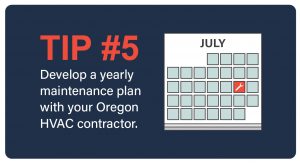 Upon moving into your new home, contact your Oregon HVAC contractor and schedule a maintenance visit. Once all issues have been addressed, develop a yearly maintenance plan with your contractor. Taking care of your HVAC system will keep your unit performing its best and can save you on energy costs.
Upon moving into your new home, contact your Oregon HVAC contractor and schedule a maintenance visit. Once all issues have been addressed, develop a yearly maintenance plan with your contractor. Taking care of your HVAC system will keep your unit performing its best and can save you on energy costs.
Residential HVAC Services for Your Portland Home
If you are new to HVAC systems and need expert advice, AAA Heating and Cooling is here to help. Whether you are looking to schedule a routine visit or have an issue that requires immediate attention, our trained technicians can get the job done. Contact us today and let us assist you with all your HVAC needs.
Is Your Business’s Commercial HVAC Unit Contributing to Allergies?
 We all look forward to spring and summer. The days are longer, the sun is shining, and flowers are in bloom. For those with allergies, however, pollen can be a nuisance. While we associate allergies mostly with the outdoors, your Portland business’s indoor air quality can affect those with allergies as well.
We all look forward to spring and summer. The days are longer, the sun is shining, and flowers are in bloom. For those with allergies, however, pollen can be a nuisance. While we associate allergies mostly with the outdoors, your Portland business’s indoor air quality can affect those with allergies as well.
What’s worse? Mold, mildew, dust, and other debris could be circulating throughout your commercial property, exacerbating allergies. Did you know that your HVAC system plays a large role in helping to mitigate allergens? Our local HVAC contractors share tips on how to improve your air quality.
Is Your Commercial HVAC System Making Allergies Worse?
Indoor air pollution comes from a variety of sources and can trigger allergic responses. The most common allergens found inside of commercial business in the Portland area include pet dander, mold and mildew, pollen, and dust mites.
With Oregon leading the nation in the top five worst cities for allergy sufferers, it’s crucial to maintain good indoor air quality.
4 Common Causes of Poor Indoor Air Quality in Commercial Spaces
1) Mold and Mildew
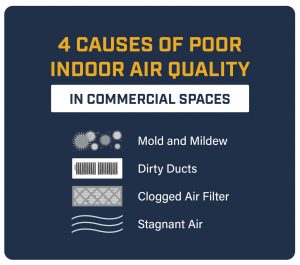 Our rainy seasons make for a perfect mold and mildew breeding ground. Mildew and mold quickly accumulate in damp, moist environments. As the spores travel through the air, they can aggravate allergies and even trigger asthma attacks. An improperly maintained HVAC system could be harboring harmful condensation and humidity. Turning on your commercial heating and air conditioning unit under these conditions could inadvertently expose people in your building to mold and mildew.
Our rainy seasons make for a perfect mold and mildew breeding ground. Mildew and mold quickly accumulate in damp, moist environments. As the spores travel through the air, they can aggravate allergies and even trigger asthma attacks. An improperly maintained HVAC system could be harboring harmful condensation and humidity. Turning on your commercial heating and air conditioning unit under these conditions could inadvertently expose people in your building to mold and mildew.
The Fix:
To assess the health of your HVAC unit, schedule an appointment with your Portland HVAC contractor. They can address any problems and ensure that your system is functioning properly. You can also set up a routine maintenance schedule to keep your unit performing at its best. If you have a serious problem with humidity, consider installing a dehumidifier for your business.
2) Dirty Ducts
Duct systems distribute hot and cool air throughout your commercial property. Over time, and without proper maintenance, air ducts can become clogged with dust, dirt, and other allergy causing debris. As the dirty air ducts circulate air through your building, the contaminants get circled as well.
The Fix:
To improve your overall air quality, have a professional perform a complete cleaning of your duct system. If your ducts are damaged from neglect, or simply past their prime, you might want to think about a replacement.
3) Clogged Air Filter
HVAC air filters are designed to trap dirt, pollen, and other pollutants and prevent them from circulating back into your commercial building. Dirty and clogged air filters can fail to function, causing pesky allergens to redistribute back into the air.
The Fix:
Check and change your air filter frequently. Our Portland HVAC company recommends checking your air filters monthly and replacing them every three months. For a high-efficiency filter, consider upgrading to a filter with a high MERV rating.
4) Stagnant Air
To help with energy efficiency, many commercial buildings are heavily insulated and air tight. While great from an energy standpoint, if indoor air doesn’t have a chance to escape you could be trapping allergens inside.
The Fix:
Even if the temperature inside seems comfortable, it’s ok to run your air conditioning unit for 20 minutes to periodically circulate the air. AC units help remove stale air and draw fresh air inside. Work with a NATE certified HVAC professional to conduct a proper inspection of your HVAC unit and make sure your air conditioner is functioning properly. This is also a good time to check your AC energy efficiency and think about an upgrade if needed.
HVAC Solutions for Commercial Buildings in Oregon
Help keep allergies at bay in your commercial building with professional HVAC services from AAA Heating and Cooling. Our skilled technicians provide professional service, expert installation, and quality repair.
Want to ready your commercial property for the allergy season and beyond? Contact us today!
Does HVAC Ductwork Go Bad?
 The condition of your ductwork is crucial to the effectiveness of your commercial or residential HVAC system. Problems with your air ducts can hinder the overall function of your HVAC system, causing the unit to work harder than needed. This can result in lower energy efficiency and poor air quality.
The condition of your ductwork is crucial to the effectiveness of your commercial or residential HVAC system. Problems with your air ducts can hinder the overall function of your HVAC system, causing the unit to work harder than needed. This can result in lower energy efficiency and poor air quality.
While ductwork needs maintenance to ensure proper output, can HVAC ductwork go bad? Your local HVAC contractor answers this important question and provides details how ductworks function.
Ductwork Details from Your Portland & Beaverton HVAC Installers
Our Beaverton and Portland HVAC company is often asked if ductwork can go bad. What does this mean? How long does residential and commercial ductwork last? What are steps you can take to ensure a healthy HVAC system? To address these concerns, it’s necessary to learn more about the function of ducts.
Ductwork 101
Ductwork is engineered to distribute airflow from your HVAC system to your entire residential or commercial building. In simple terms, hot or cool air is extracted from your entire building into the HVAC unit where it then gets heated or cooled and recycled into your property via the ducts. Your HVAC goes through this cycle continuously to ensure ideal internal temperatures.
Think of ducts as air conduits that allow air a pathway to and from your HVAC unit. With that in mind, the straighter and shorter the track of the duct is, the better the air flow. In addition, any twists, blockages, and debris in your ductwork will impede optimum air flow. Therefore, it is important to make sure your ducts are properly cleaned and professionally installed for maximum performance.
So, Can Your Home or Business’s Ductwork Go Bad?
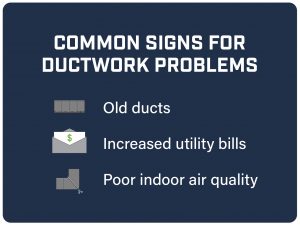 While you can think of ductwork as pathways that air travels through, that doesn’t necessarily mean they are passive elements in the air conditioning and heating cycle. As air moves through the ducts, they can shift, expand, and contract. Winter heating causes the ducts to expand and summer cooling makes them contract.
While you can think of ductwork as pathways that air travels through, that doesn’t necessarily mean they are passive elements in the air conditioning and heating cycle. As air moves through the ducts, they can shift, expand, and contract. Winter heating causes the ducts to expand and summer cooling makes them contract.
These movements put internal stress on the metal of the ductwork. While they don’t cause the system to go bad, per se, they will cause duct deterioration over time. What effect does this have on your ductwork? Seams can pull apart and ductwork can become detached, which impedes proper heating and cooling. This also opens the door to debris and water condensation, which can lead to rust.
Common Signs for Ductwork Problems
Now that you know the importance of having healthy ductwork, how can you tell if your ducts are experiencing problems?
- Old ducts: If your residential or commercial ductwork is over 15 years old, and you haven’t performed routine maintenance, you might have deterioration in your ducts.
- Increased utility bills: If your utility bills are higher than expected, it could be a result of leaky or obstructed ducts.
- Poor indoor air quality: Gaps in your ducts can let irritants like pollen and dust into your residential or commercial property. This can not only aggravate allergies or asthma, but it can cause damage to your HVAC unit.
If you notice any of the above symptoms, let your HVAC contractor know right away to prevent any further damage.
How Long Does Ductwork Last Before It Needs Replacing?
Even well-maintained ducts might eventually need to be replaced. How much life can you get out of your HVAC system before installing a new one? The good news is most ductwork lasts approximately 10 to 15 years.
If your ducts are older than 15 years, you might consider a complete replacement, or you might be able to just replace some of the components. An HVAC professional can perform an examination and determine the best solution.
Your HVAC Ductwork Specialists in Beaverton and Portland
AAA Heating and Cooling serves the Beaverton and Portland areas. We perform routine maintenance to keep your ducts in top shape. We also provide HVAC repair and complete installation. Contact us today for all your ductwork and HVAC needs.
3 Reasons Lights Flicker When Your Home’s AC is On
As a homeowner you may have noticed your lights flicker when you power up your air conditioning unit. What causes your lights to dim? Could it be a problem with the AC unit itself? Is there something wrong with the electricity in your home? Our Beaverton residential heating and air conditioning pros answer these questions and more.
Understanding Your Residential Air Conditioning Unit
Think of electricity in your home the same way you do your residential plumbing. Much like the water in your pipes, there is only so much electricity available in your home at any given time. When you flush your home toilet while running a shower, the water pressure splits between the two fixtures. Electricity behaves in a similar manner.
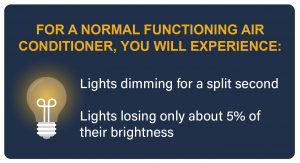 When you turn on a high-energy device, like a modern AC unit, the initial power draw can put a substantial drain on your available electricity. This can cause your lights to dim. While flickering lights might seem worrisome, this is often a normal electrical response to power being diverted.
When you turn on a high-energy device, like a modern AC unit, the initial power draw can put a substantial drain on your available electricity. This can cause your lights to dim. While flickering lights might seem worrisome, this is often a normal electrical response to power being diverted.
How can you tell if the dimming lights are a normal occurrence or signs of a larger problem? For a normal functioning air conditioner, you will experience:
- Lights dimming for a split second
- Lights losing only about 5% of their brightness
Lights that dim for a long time, flicker on and off rapidly, or only dim on particular circuits could be symptomatic of more serious electrical issues. What are the more serious issues and when should you speak with a professional?
1. Damaged or Loose Wires
Do your lights turn off and on quickly when you start up your AC unit? This could be indicative of loose or damaged electrical wires. Faulty wires can cause current loss to your lightbulb. Plus, the voltage drop that occurs when your air conditioner kicks on can exacerbate the problem, making your lights flicker rapidly. Not sure if your wires need repair? Make an appointment with your Beaverton HVAC contractor to check if your wires are discolored, charred, or loose.
2. Weak or Broken Capacitor
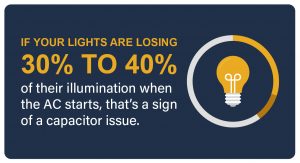 If your lights are losing 30% to 40% percent of their illumination when the AC starts, that’s a sign of a capacitor issue. Your AC capacitor functions like a battery, giving your compression motor the boost of energy it needs to power up. Much like your car battery, your air conditioning compressor can lose its ability to store and maintain power.
If your lights are losing 30% to 40% percent of their illumination when the AC starts, that’s a sign of a capacitor issue. Your AC capacitor functions like a battery, giving your compression motor the boost of energy it needs to power up. Much like your car battery, your air conditioning compressor can lose its ability to store and maintain power.
What does this mean? Your AC is pulling more voltage from other appliances and putting more stress on your compressor to start up. This can cause the lights to temporarily lose their brightness.
3. Overloaded Circuits
Overloaded circuits can present a serious problem. According to the National Electric Safety Code, all major appliances should be on their own dedicated circuit. If you trip your circuit breaker, or hear any buzzing sounds when you turn on your AC unit, you could be overloading your circuits. If you notice any of these signs, unplug any household devices that share the same circuit as your AC unit. This will reduce your risk of fires and electrical shock. For a long term solution, you will need to get a complete assessment and potential repair from your HVAC professionals.
Home HVAC Solutions in Beaverton & Portland
If you aren’t sure what might be causing your flickering lights, call in the experts. AAA Heating and Cooling is your go-to residential HVAC servicing and installation company. We now have two locations, in Portland and Beaverton!
Why Choose a NATE-Certified Oregon HVAC Company?
 Whether you own a home or business in Portland or Beaverton, it’s essential to choose a dependable technician for all your HVAC installation and repair needs. One way to guarantee worry-free results is to work with a NATE-certified HVAC contractor.
Whether you own a home or business in Portland or Beaverton, it’s essential to choose a dependable technician for all your HVAC installation and repair needs. One way to guarantee worry-free results is to work with a NATE-certified HVAC contractor.
North American Technician Excellence (NATE), is an independent organization that certifies technicians in the HVAC industry. NATE-certified technicians undergo an intensive exam, which requires them to demonstrate their working knowledge of commercial and residential HVAC systems.
NATE-certified techs focus their skills in specific areas, including:
- Heat pumps
- Furnaces
- Air conditioning
- Refrigeration
- Indoor air quality
- And more
When you choose an HVAC company with Nate certification, like AAA Heating and Cooling, you can expect professional results and the highest-quality service and equipment.
6 Reasons to Use Our HVAC Services in Beaverton & Portland
Our skilled NATE-certified technicians take the worry out of HVAC installation and repair. Here are some of the benefits you can expect from AAA Heating and Cooling:
1. Lower Utility Bills
 Proper HVAC installation and routine maintenance is key to reducing energy costs. A well-maintained HVAC system lowers overall utility bills. Preventative maintenance starts with scheduling an annual checkup with our technicians.
Proper HVAC installation and routine maintenance is key to reducing energy costs. A well-maintained HVAC system lowers overall utility bills. Preventative maintenance starts with scheduling an annual checkup with our technicians.
2. Increased HVAC System Longevity
Professional upkeep of your residential and commercial HVAC system ensures all mechanisms are functioning properly. This helps avoid costly repairs and extends the life of your unit. Our pros know the ins-and-outs of proper maintenance and can maximize the longevity of your HVAC system.
3. Better Indoor Air Quality
Neglected HVAC units can affect your indoor air quality. Clogged air filters and leaky ductwork are two main factors that can contribute to indoor air pollution. The good news is our local HVAC contractors can help you diagnose and reverse these potential problems. Once the initial problems have been addressed, schedule routine maintenance of your air filter and ducts to prevent air quality issues in the future.
4. Reliable Repairs and Installation
Our NATE-certified HVAC specialists are focused on maintaining the lifespan of your HVAC unit. They perform repairs for long-lasting results—not just a quick fix. This translates to a job done thoroughly the first time around, saving you time and money, and giving you greater peace of mind.
5. Superior Energy Efficiency
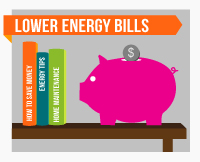 Want to enhance your energy efficiency? We’ll examine every facet of your HVAC unit to optimize performance and increase energy savings. Our HVAC installers can also recommend new, renewable energy options for your home, helping you save money every month on heating and cooling.
Want to enhance your energy efficiency? We’ll examine every facet of your HVAC unit to optimize performance and increase energy savings. Our HVAC installers can also recommend new, renewable energy options for your home, helping you save money every month on heating and cooling.
6. Professional Advice and Knowledge
NATE-certified technicians are experts in their field and have a wealth of knowledge to share. Looking for advice on reducing humidity in your home? Need resources on commercial heat pumps? Our expert HVAC teams in Beaverton and Portland are always available to share their knowledge so you can make informed decisions about your heating and cooling needs.
Visit Our HVAC Company Located in Beaverton & Portland
HVAC systems are intricate machines that require the best technical expertise to keep them at peak performance. At AAA Heating and Cooling, we provide quality repair, expert installation, and professional advice. Want to ensure the health and longevity of your HVAC unit? Let one of our dedicated HVAC professionals assist you. Contact us today!


